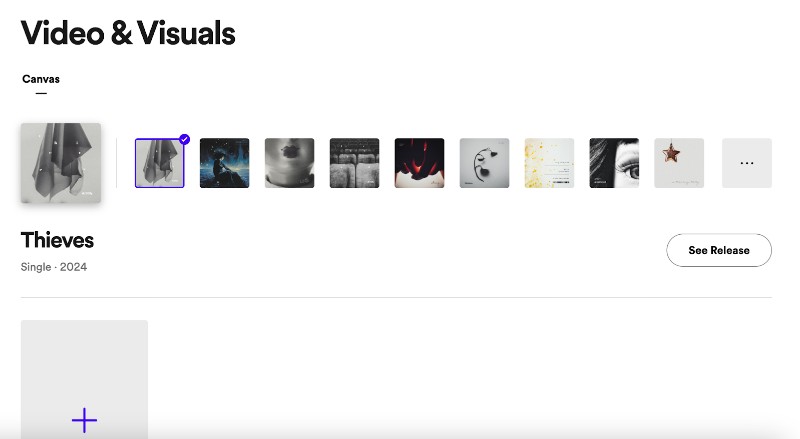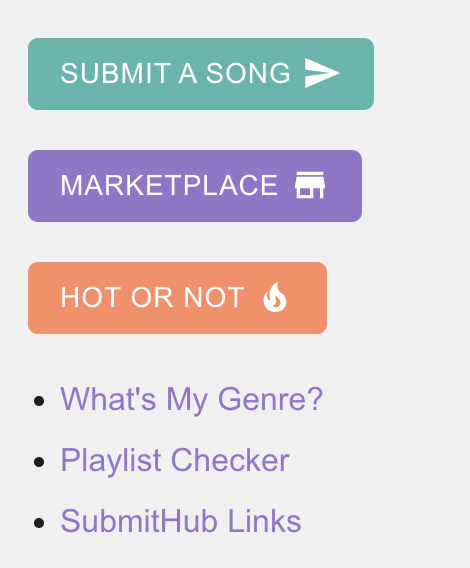10 Music Promotion Tools You Should Be Using in 2026

To help you boost your music promotion efforts, the team over at Submithub have put together a list of some of the most effective music promotion tools you can access to generate more excitement around your releases.
The 10 best music promotion tools for musicians
Music promotion can sometimes be a costly part of releasing music online. Luckily, there are now more ways than ever to promote your music independently - and for free. Here are some of the best tools you can make use of to really stand out this year.

1. Spotify for Artists
Spotify for Artists might seem like a cliché recommendation, but you'd be surprised by how many artists don’t use it to its full potential. There is a wealth of features, such as pitching your music to Spotify editorial playlists, uploading Canva visuals, measuring listener engagement, and customising your Spotify artist profile with photos (and a punchy bio) that highlights your recent releases and influences.
On top of this, Spotify offers nicely packaged data analysis, the option for you to add your upcoming tour dates, sell merch, and extra promo tools like Discovery Mode - all of which increase your online presence.

To get started, simply sign up for Spotify for Artists, claim and create your artist profile, and get your music verified.
2. SubmitHub
First and foremost, SubmitHub is a tool for sending your music to curators for promotion (Spotify playlisters, Hype Machine bloggers, Influencers, etc). It’s a transparent and thoroughly vetted service that musicians can trust.
The SubmitHub team is constantly adding useful, extra features to help artists with the digital aspects of their careers. Some of the top features include:
- SubmitHub Links: A completely free landing page builder that's easy to use, lightning-fast, and totally customisable. It includes analytics, custom domains, Meta API integration, and more. Great for your music, merch, social media ads, and link-in-bios.
- Playlist Checker: Offers a great analysis of Spotify playlists. Notably, it’s a way to check if a playlist has bot followers or engages in payola – both of which can significantly harm you as an artist (a free alternative to Chartmetric / IsItAGoodPlaylist)
- SubmitHub Marketplace: Similar to Fiverr, but aimed exclusively at musicians, and with better quality control. Find music services like mastering, album artwork, ad set-up consultation, and more.
- What's my genre: A free AI-driven genre identifier that helps you pinpoint your song/s genre(s).
- Hot or Not: A tool for receiving feedback on your music from other artists. This helps you gauge how your song is or will be received, and you can also earn free SubmitHub Premium credits for submitting to curators by giving feedback yourself.

3. Reddit
Although sometimes overlooked as a social media marketing tool, promoting music on Reddit can prove very effective.
By engaging authentically in communities that are directly (country music) or indirectly (cowboy hats) related to your music, you can gain new fans, collaborators, advice, and gather useful feedback. Reddit offers fantastic opportunities for promotion and networking, so make sure to be active - and not just for sharing your music.

4. Canva
Artists can use Canva to create social media post graphics, album covers, and even short videos without needing to be a design expert. It’s free, with a premium subscription option if you want more features.
It's much easier to use compared to professional tools like Photoshop, but very effective for creating good-looking visuals. Upload music to Canva with Ditto.

Note: A special shout-out goes to Canva’s free-to-use Colour Wheel, which helps you generate consistent colour and font combinations.
5. CapCut
CapCut is an easy-to-use video editor for creating professional TikToks, music videos, lyric videos, and other forms of promotional content. Similar to Canva, it can be used for free, with a paid option if you need more advanced features.
Another benefit of using CapCut is that the app is excellent on both desktop and mobile, so you’re able to tweak things on the move.
.jpeg)
A quick tip if you’re making content to use for running ads: always use videos. Movement catches the eye much more than a static picture. Even if you only have a picture (e.g. Your cover art), add it to CapCut, apply some simple animation effects (noises, like a WHOOSH sound, can be very effective), and voilà! You have a video for your Meta ads.
6. Musixmatch
Musixmatch is a web-based service that allows you to upload and time-sync lyrics to your songs. This small but important step allows you to offer your fans a way to connect more deeply with your music.
Spotify actually uses Musixmatch to add lyrics to their platform. Learn more about uploading your lyrics to streaming platforms.

7. Disco
Disco.ac is one of our favourite music management software tools. Think Dropbox, but specifically for music. You upload and store your music on Disco, which makes it easier to collaborate on projects, manage your library, and share songs with others. The peace of mind that your music is backed up, organised, and easily shareable is worth paying for.
Note: Disco offers a free trial, but is a paid app.

8. TikTok
If you haven't tapped into the power of short-form video, it's time to start. Even if you're the type of artist to be more reserved; ie. someone who isn’t keen on dancing in front of their smartphone camera, there are plenty of other ways to share content.
From bedroom acoustic covers, green-screen-style commentary about your latest song or music video, “stitching” with other creators, or sharing vertical lyric videos or footage from gigs... even if you don't go viral, you're still reaching tens to hundreds of potential fans - for free.

By the way, CapCut is affiliated with TikTok, making it very easy to share anything you create in the video editing app to your TikTok account.

9. Meta Ads/Business Manager
Ask any music marketing expert, and they'll recommend setting up Instagram and Facebook ads. That usually means promoting your latest release, or your Spotify "This Is" playlist, or reminding people of successful past releases.
Make sure to test different images/videos, which, through clever ad targeting, can attract highly relevant followers who are more likely to engage with your projects. Running ads is definitely worth incorporating into your promotional strategy.
10. Loomly
A slightly less mainstream social media scheduler, but one that's truly worth mentioning if you need a tool for generating ideas, planning, and automating your posts across different platforms.
It's not too expensive, with a user-friendly flow and interface. Loomly is an affordable tool that can save you time and help with consistency and analytics across different social media platforms.

P.S. If you're on a very tight budget, consider Buffer as an alternative scheduling tool, offering a limited but free option to schedule content on up to three social media platforms.
Bonus tips:
- TinyURL: This handy tool is useful for shortening long URLs in your bios or social media posts; especially for Instagram posts.
- Google Alerts: Stay on top of online mentions by setting up Google Alerts for your artist name. This helps you track industry buzz and audience engagement.
- ChatGPT/Gemini: While we don't recommend using AI to generate all of your texts, as they may sound generic and often unnatural, these tools can be fantastic for proofreading your texts and suggesting ideas for content.
There are thousands of tools out there, of course, but these are the ones we recommend checking out at the moment. Their usefulness will, however, be determined by how much and how effectively you use them. You don't need to do everything, everywhere, all at once. It's not a race, more like a long-distance run.
Put your music out there one step at a time, and with the right tools, consistency, and a bit of patience, you'll find and grow your audience steadily. Every big success starts with small, deliberate steps.



.svg)


